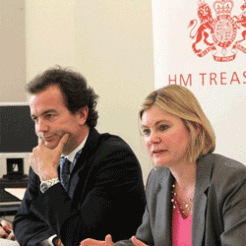The new Secretary of State for International Development has ordered an independent review of the Department for International Development spend on contractors, which amounted to £468m in 2010/11.
Justine Greening has commissioned the Independent Commission for Aid Impact (ICAI) to undertake a study of DFID's use of contractors, to be published in the first quarter of 2013. The move follows the former Economic Secretary to the Treasury and Secretary of State for Transport's appointment to oversee the department on 5 September.
In its terms of reference for the investigation, ICAI advises that in 2010/11 DFID provided payments over £100,000 to 182 providers, while 63 per cent of spending went to just 20 of these organisations. Examples provided include £25m to the Crown Agents for Overseas Governments and Administrations Ltd to procure large African health programmes and £23m to GRM International Ltd for works including "assisting an enabling state programme in Nepal".
Greening's demand for a review follows revelations that directors at some of the firms funded by DFID were being paid seven-figure salaries.
DFID has been the subject of intense criticism by the Telegraph which made the revelations and claims that the organisation is inspiring a "foreign aid gravy train", with millions still going to wealthy countries such as China and Brazil, and encouraging "poverty barons" by allowing the sums to be paid to directors. It gave the example of Maxwell Stamp which was paid by DFID for projects such as community legal services in Bangladesh. "Its highest-paid director earned at least £326,000, doubling his salary from the year before," the newspaper claimed.
But the Telegraph's reports are not the first time such concerns have been raised. In February 2011 the International Development Committee raised concerns with ICAI about the use of external suppliers by DFID to provide technical assistance, stating that it may limit the ability of developing countries to build up expertise. In addition it warned that "DFID could do more to drive down fee rates" and prove value for money.
A public consultation by the ICAI last year found an appetite for greater scrutiny over the cost of consultants paid for by DFID and the profits they generate.
A DFID spokesperson advised that Greening has also requested it produce its own report on the Department's spend on technical experts.
"As the new International Development Secretary she is taking a close look at every aspect of the Department's spending," they said.
The Department added that commissioned organisations "have won contracts to work for DFID through a best-value, competitive bid process".
National Audit Office pressure
DFID's use of multilateral aid agencies was also put under the microscope in a National Audit Office multilateral aid review on 19 September. It called for the Department to "tighten its approach to promoting and monitoring reform within individual agencies" and raised concerns about the department having "limited scope" to reduce funding to organisations which were underperforming on value for money.
The NAO assessed DFID's own report on 43 organisations it provided with £3.6bn of core funding in 2010/11. Nine organisations were rated as 'poor' in terms of value for money by DFID. While DFID announced it would cease funding to four of those organisations, the NAO's multilateral aid review advised that one of the other 'poor' rated organisations had to retain its funding from DFID as part of its treaty obligation to the EU budget.
"Such constraints increase the importance of promoting reform in multilateral bodies to increase their effectiveness," the NAO advised.
The four organisations to lose funding include three UN organisation - the United Nations International Strategy for Disaster Reduction; the United Nations Human Settlement Programme and the United Nations Industrial Development Organisation - as well as the the International Labour Organisation. A total of £8m was paid to these organisations in 2010/11.









